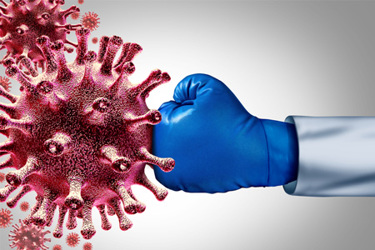Beyond Vaccines: Envisioning A New Approach To Protecting The World From Infectious Disease
By Phillip Samayoa, Ph.D., Senior Vice President, Head of Corporate Development, Generation Bio

We’re finally turning a corner on the COVID-19 pandemic, thanks in large part to the biopharma industry’s tremendous work over the past year to bring forward multiple highly effective vaccines.
Yet it is equally important to realize that – as effective as they are – vaccines do not address all our challenges when it comes to fighting infectious disease.
Several factors complicate the ability of vaccines to serve as a singular solution to this or any future pandemic. Vaccines rely on a person’s immune system to do the hard work of producing antibodies in the near term and training T and B cells for the long-term work, which involves memorizing the virus’s signature and standing ready to clear infected cells and crank out a fresh batch of neutralizing antibodies upon future encounters with the virus.
We know from experience with previous vaccines that this process of teaching our immune system does not work for everyone.
For example, people with compromised immune systems, such as those living with genetic diseases or HIV or those who are receiving immune-suppressive treatment for organ transplant or cancer, may not be protected by existing COVID-19 vaccines. In fact, an estimated 12 million people in the U.S. are immunocompromised, leaving a substantial population without sufficient protection.
Additionally, some diseases may require more persistent or higher levels of virus-neutralizing antibodies than our immune system can churn out on its own.
All this raises the question: What if we could create a more efficient way to give the body a “rapid response team” of antibodies ready to take on invading viruses?
Generation Bio is working to do just that with a new approach called endogenous therapeutic antibody production, or ETAP.
Our idea is both simple and radical: We want to equip people with the ability to generate their own protective antibodies by turning their liver cells into tiny medicine-making factories. We believe it may be possible to use our non-viral platform to deliver the genetic code that these cells need to produce a very specific neutralizing antibody, day in and day out, perhaps even for years on end. Physicians could then monitor antibody levels using a simple blood test with the potential to redose if immunity started to wane.
ETAP could bolster immunity in those who don’t respond well to vaccines, such as the immunocompromised. In addition to preventing infection, we believe it could also generate the persistently high antibody levels needed to treat chronic infections such as HIV or hepatitis B.
In collaboration with the team at Vir Biotechnology, we applied ETAP to COVID-19 as a proof-of-concept, which could serve as a springboard to future clinical programs in other infectious diseases.
We recently presented data at the 2021 American Society of Gene and Cell Therapy meeting showing that our closed-ended DNA (ceDNA) construct encoding a SARS-CoV-2 antibody was able to generate persistent antibody concentrations in mice after a single dose at levels that may be therapeutically relevant in humans. Of note, in separate ex vivo experiments, these endogenously produced antibodies retained the same protective neutralizing properties as traditionally manufactured monoclonal antibodies.
With this proof of concept in hand, we’re working to optimize and advance ETAP. We’re particularly excited that this platform has the potential to be adapted again and again to treat other challenging diseases; we could switch out the genetic code to prompt expression of a different therapeutic antibody.
Another important feature is that ETAP uses a capsid-free manufacturing process with cell-free, rapid enzymatic synthesis of ceDNA. This should allow production of antibody-expressing ceDNA at a scale that could enable the treatment of potentially hundreds of millions of patients, unlike other antibody gene therapy strategies that rely on viral vectors.
The pace and scope of innovation marshalled to date against SARS-CoV-2 has been extraordinary, and gives us hope that we can quickly mobilize new solutions. At the same time, we must prepare ourselves to develop complementary approaches that provide inclusive, durable protection for everyone across a range of infections. We’re excited by the opportunity to play a part in stopping some of the most challenging diseases to come our way.
 Phillip Samayoa is Senior Vice President, Head of Corporate Development at Generation Bio. Since joining Generation Bio in 2017, Phillip has provided operational and strategic leadership across exploratory research, portfolio strategy, and business development. Phillip was a principal at Atlas Venture where he focused on building novel platform therapeutics companies, was a co-founder of Generation Bio and Dyne Therapeutics, and a board observer for HotSpot Therapeutics. Phillip was previously director of MRL Ventures Fund at Merck, where he worked to construct the strategic fund and led investments in early-stage therapeutics technologies including Alector, Translate Bio, and Spero Therapeutics. Prior to that, Phillip was an associate at Flagship Pioneering where he was involved in building several startups, including Codiak BioSciences and Indigo Ag. Phillip graduated from MIT with dual Bachelor of Science degrees in Biological Engineering and Physics, and earned his doctorate in Systems Biology from UCSD, where he was a NSF graduate research fellow.
Phillip Samayoa is Senior Vice President, Head of Corporate Development at Generation Bio. Since joining Generation Bio in 2017, Phillip has provided operational and strategic leadership across exploratory research, portfolio strategy, and business development. Phillip was a principal at Atlas Venture where he focused on building novel platform therapeutics companies, was a co-founder of Generation Bio and Dyne Therapeutics, and a board observer for HotSpot Therapeutics. Phillip was previously director of MRL Ventures Fund at Merck, where he worked to construct the strategic fund and led investments in early-stage therapeutics technologies including Alector, Translate Bio, and Spero Therapeutics. Prior to that, Phillip was an associate at Flagship Pioneering where he was involved in building several startups, including Codiak BioSciences and Indigo Ag. Phillip graduated from MIT with dual Bachelor of Science degrees in Biological Engineering and Physics, and earned his doctorate in Systems Biology from UCSD, where he was a NSF graduate research fellow.
